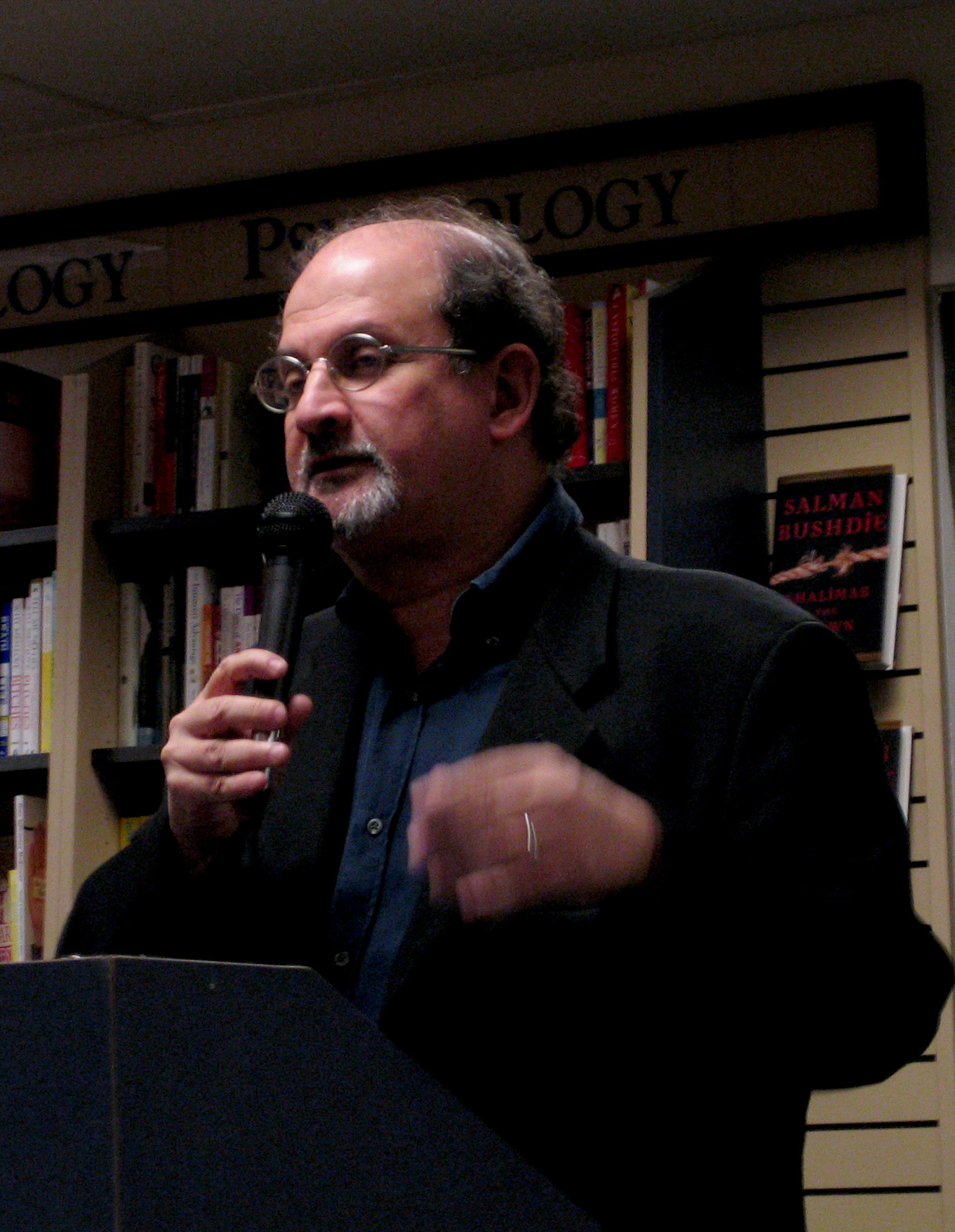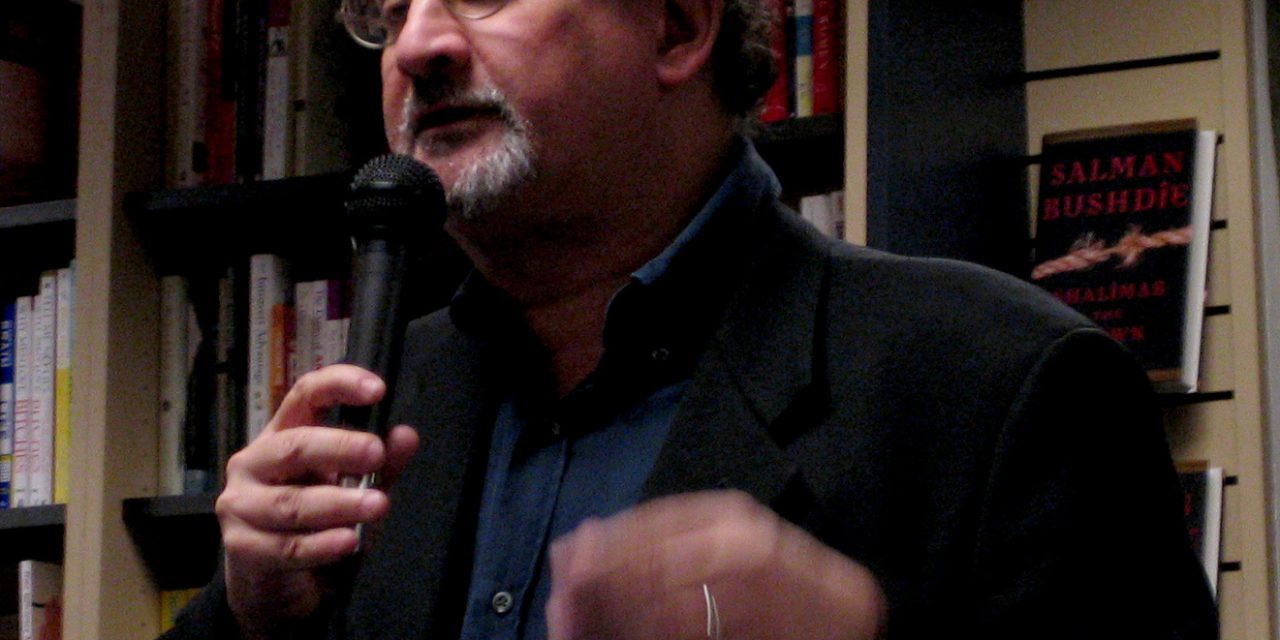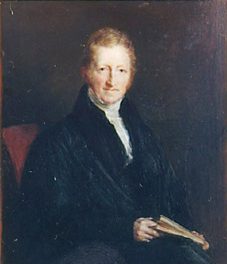 The booker prize winner, Sir Salman Rushdie, whose book Midnights Children has been judged in 1991 as the best book to receive booker prize in 25 years, has been knighted by the Queen of England. He is also the author of the book, Satanic Verses. The followers of the religion of peace, Islam, began responding with their predictable behavior, terror threats and riots. Sakshi Research Team compiles the information to give you a background of the book and why it is important with Islam.
The booker prize winner, Sir Salman Rushdie, whose book Midnights Children has been judged in 1991 as the best book to receive booker prize in 25 years, has been knighted by the Queen of England. He is also the author of the book, Satanic Verses. The followers of the religion of peace, Islam, began responding with their predictable behavior, terror threats and riots. Sakshi Research Team compiles the information to give you a background of the book and why it is important with Islam.
A brilliant imaginative writer and a courageous critic of Islam, Sir Salman Rushdie, have courted controversies always. His highly imaginative novels would have won Nobel Prize for Literature if not for the critiques he has for Islam. The latest controversy is regarding the Knighthood granted by the Queen of England. However, the Islamic world has begun opposing this honor citing the book written by the author, Sir Salman Rushdie. Religious affairs minister of Pakistan, Mohammed Ijaz ul-Haq, called for suicide attacks on UK while keeping the foreign aid, £480 million, graciously given by the UK.
What is This Book, Satanic Verses, All About?
The Satanic Verses is Salman Rushdie's fourth novel, first published in 1988 and inspired in part by the life of Muhammad. The novel consists of a frame narrative, using elements of magical realism, interlaced with a series of sub-plots that are narrated as dream visions experienced by one of the protagonists. The frame narrative, like many other stories by Rushdie, involves Indian expatriates in contemporary England. The two protagonists, Gibreel Farishta and Saladin Chamcha, are both actors of Indian Muslim background. Farishta is a Bollywood superstar who specializes in playing Hindu deities. Chamcha is an emigrant who has broken with his past Indian identity and works as a voice over specialist in England. One of these sequences contains most of the elements that have been criticized as offensive to Muslims. It is a transformed re-narration of the life of the prophet Muhammad (called "Mahound" or "the Messenger" in the novel) in Mecca ("Jahilia").
At its centre is the episode of the "Satanic Verses", in which the prophet first pronounces a revelation in favour of the old polytheistic deities in order to win over the population, but later renounces this revelation as an error induced by Shaitan. There are also two fictional opponents of the "Messenger": a demonic heathen priestess, Hind, and an irreverent skeptic and satirical poet, Baal. When the prophet returns to the city in triumph, Baal organises an underground brothel where the prostitutes assume the identities of the prophet's wives. Also, one of the prophet's companions claims that he, doubting the "Messenger"'s authenticity, has subtly altered portions of the Qur'an as they were dictated to him. (Source Wikipedia).
Was it really A Part of Mohammed’s Life?
Muslimhope.com points out that “It must be pointed out again that the ‘Satanic Verses’ event is not something made up by non-Muslims. The event is recorded by the earliest Islamic sources available on Muhammad’s life. No one should think that it is a story made up by people who are critical of Islam. It is an episode directly found in the early Islamic records.”
Muslimhope.com cites the original Quranic verses: “What Did the Qur’an Originally Say? The Star Sura (Sura 53) verses 19-20 say, "Have ye seen Lat, and ‘Uzza, And another, the third (goddess), Manat?" Allah was prominent in Pre-Islamic Arabia, as a god with three daughters: al-Lat, al-Uzza, and Manat. (Note that al- means "the".).
Direct Evidences from Four Early Biographers
The four early biographers of Mohammed wrote that these verses originally were followed by: "These are the exalted cranes (intermediaries) Whose intercession is to be hoped for." Interpretation: Allah’s daughters were considered heavenly beings of intercessors. High altitude Numidian cranes were a metaphor for them. An alternate reading for "is to be hoped for" (turtaja) is "is accepted with approval" (turtada). (From Alfred Guillaume’s translation of Ibn Ishaq’s The Life of Mohammed p.166.
Later, this passage was taken out and the following was put in its place: "What! For you the male sex, And for him, the female? Behold, such would be Indeed a division Most unfair." (verses 53:21-22 today) Interpretation: Those who believed in Allah’s three daughters were unfair toward Allah, since they all preferred sons yet said that Allah had only daughters.
Muslimhope.com again cites the four early Muslim biographers of Mohammed who are accepted by the Islamic world citing this. Al-Wahidi/Wakidi (died 207/823 A.D.), Ibn Sa’ad/Sa’d (died 230/845 A.D.), Ibn Isaq/Ishaq (died 145/767 or 151/773 A.D.), and Ibn Jarir al-Tabari (died 923 A.D.) accepted this.
Indirect Evidences of Hadiths and the Koran
Also they cite indirect evidences from Hadiths and Quran. For example, the verse Sura 22:52 says, "Never did We send An apostle or a prophet Before thee, but, when he Framed a desire, Satan Threw some (vanity) Into his desire: but God Will cancel anything (vain) That Satan throws in, And God will confirm (And establish) His Signs;…" This came has a consolation to Mohammed after he recited the satanic verses.
Why Are the Present Day Muslims So Offended by This Incident?
This one verse demolishes the Islamic foundations and exposes Mohammed as false prophet and Islam as a false religion. Answering Islam website summarizes the consequence of these verses as:
(a) Mohammed a False Prophet: Muslims must agree that Mohammed was a false prophet for at least sometime. How else can he recite satanic verses?
(b) Koran has Been Modified: It shows the Koran is not “uncorrupted” as Muslims claim. It has been modified.
(c) Koran Disproves Koran: There is a challenge that the Qur'an and Islamic leaders issue; it is to produce a sura like the Qur'an: And if you are in doubt concerning that We have sent down on Our servant, then bring a sura like it. (Qur'an 2:23, Arberry). They say the Qur'an is miraculous in beauty and no one can make anything to compare to it. However, the event of the Satanic Verses casts doubt over this claim. For in this event Muhammad spoke words from Satan but everyone thought these verses were part of the Qur'an for the believers were holding that what their prophet brought from their Lord was true, not suspecting a mistake or a vain desire or slip. (Ibn Ishaq, pp. 166). Thus the Islamic sources (sirat) record that Satan produced verses which sounded exactly like those of the Qur'an. If they did not sound like the Qur'an then surely Muhammad, his followers and the Quraysh would never have accepted them?
Is it not clear now why Islam is so afraid of truth that it has to issue death threats to silence its critics? We request our Muslim brothers and sisters not to support a lie. If they support, they themselves become liars.
{moscomment}








http://www.angelfire.com/rebellion2/fr33minds/SalmanRushdie_satanic_verses.pdf